Archived Fire Damage Blog Posts
The Power of a National Network Right Here in Auburn/Enumclaw
11/20/2024 (Permalink)
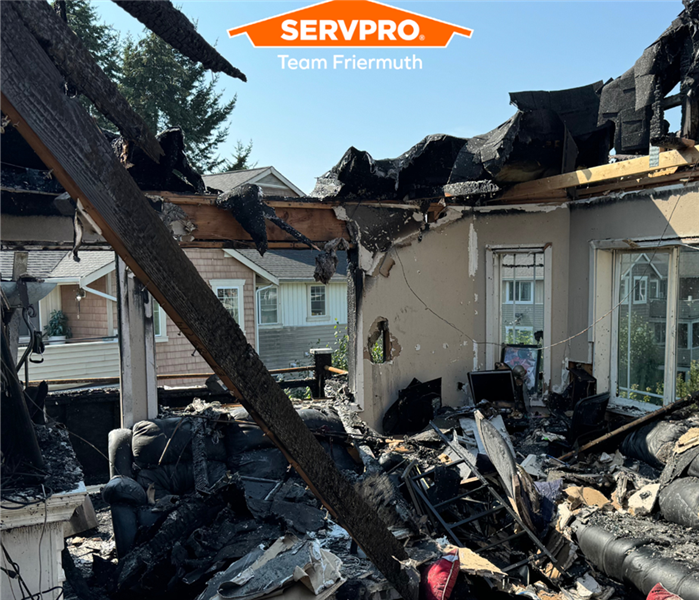 SERVPRO of Auburn/Enumclaw Commercial Fire Restoration performed on a multi-family residence.
SERVPRO of Auburn/Enumclaw Commercial Fire Restoration performed on a multi-family residence.
Trusted Restoration Partners for Fire Damage and Beyond
When disaster strikes, having a reliable restoration partner with the expertise, resources, and quick response times is essential. SERVPRO of Auburn/Enumclaw is not only your trusted local source for fire damage restoration but also part of a nationwide network equipped to handle disasters of any size. Our team supported large-scale recovery efforts, such as the communities affected by the Maui Fires in 2023, showcasing the strength and dedication we bring to every job, including fire restoration in Auburn and Enumclaw.
A Nationwide Network, Locally Committed
As a locally owned SERVPRO® franchise, we’re proud to serve the Auburn and Enumclaw communities. But we’re more than just a local team. Our connection to the SERVPRO network allows us to leverage national resources, including specialized fire damage restoration equipment, additional personnel, and advanced recovery techniques.
Faster to Any Size Disaster
When it comes to fire damage, a swift response is critical to preventing further loss. SERVPRO of Auburn/Enumclaw is known for its rapid response capabilities, deploying highly trained technicians and top-tier equipment. Whether we’re restoring a small office after a minor fire or addressing widespread fire and smoke damage, our team is ready to act quickly and effectively.
Comprehensive Fire Restoration Services
From soot and smoke removal to structural cleaning and deodorization, we handle every step of the fire damage restoration process. Our comprehensive approach ensures you don’t need to juggle multiple contractors during an already stressful time. Our goal is to make fire damage “Like it never even happened.”
Local Expertise, National Strength
SERVPRO of Auburn/Enumclaw delivers personalized, community-focused service while harnessing the resources of a national leader in restoration. Whether you’re dealing with fire damage, water intrusion, or another disaster, we’re equipped to help you restore your property and peace of mind.
If fire damage impacts your property, reach out to SERVPRO of Auburn/Enumclaw. Our dedicated team, backed by a powerful network, is Here to Help® you recover swiftly and completely.
Commercial Properties Affected by Fire Damage in Auburn/Enumclaw
11/13/2024 (Permalink)
If your business in Auburn, WA, has suffered from fire damage you may be wondering what to do next. There are a few recommended actions that may help get the restoration process started. Here are some steps to consider when beginning your fire cleanup.
1. Board Up the Property
One of the first steps many experts recommend is to board up the damaged property. This usually entails putting ply-board or tarps over the exterior of the damaged area in order to protect it from external forces. Not only can this help prevent further damage from wind and rain, but it may keep critters out of your property. It may also help discourage looting. Many insurance companies also require boarding up the area as part of your policy when filing a claim.
2. Get a Damage Assessment
Before repairs can begin, the fire damage on the property will need to be assessed. A team of fire restoration professionals can look over the damages and inform you what repairs will be necessary. These professionals can also formulate a plan for the best order of repair, and provide you or your insurance company with a repair cost estimate.
3. Begin Repairs
Once your property is protected against further damage, and you have an estimate of the repair needs, then you can begin the fire cleanup process. Repairs usually include debris removal, smoke odor remediation, and the cleaning of damaged items and equipment. Some companies may also offer electronics cleaning, document restoration and upholstery cleaning.
After fire damage hits your business these steps may help you get on track with your restoration. Boarding over the damaged area can help prevent the need for additional repairs. A damage assessment can help you understand what needs to be done and the best order. After your assessment you can begin the process of restoring your commercial property.
Fire Prevention Tips for a Safe Winter in Auburn and Enumclaw
11/5/2024 (Permalink)
 Fire Damage Restoration Project SERVPRO of Auburn/Enumclaw
Fire Damage Restoration Project SERVPRO of Auburn/Enumclaw
As the colder months approach in Auburn and Enumclaw, the risk of house fires rises. With candles, fireplaces, and space heaters becoming more common for warmth and ambiance, it's essential to understand the potential dangers and how to mitigate them.
Common Winter Fire Hazards
- Candles: Unattended candles can easily ignite flammable materials nearby, leading to fires. Always keep them within sight and extinguish them before leaving the room.
- Fireplaces: Without proper maintenance, fireplaces can accumulate creosote, which poses a fire risk. Regular inspections and cleanings are crucial.
- Space Heaters: These can overheat or be placed too close to flammable objects. Always keep heaters at least three feet away from anything that can catch fire.
Safety Tips for a Cozy Winter
- Use Candles Safely: Opt for flameless candles when possible. If using real candles, place them on stable surfaces and never leave them unattended.
- Maintain Your Fireplace: Schedule an annual inspection and cleaning to prevent chimney fires. Use seasoned wood to minimize creosote buildup.
- Space Heater Guidelines: Use heaters with safety features like automatic shut-off. Ensure they’re placed away from flammable items and avoid using extension cords.
- Install Smoke Alarms: Ensure smoke detectors are installed on every level of your home and test them monthly.
- Have an Escape Plan: Create and practice a fire escape plan with your family. Know two ways out of each room and have a designated meeting place outside.
Why Choose SERVPRO of Auburn/Enumclaw?
If you experience fire damage this winter, SERVPRO of Auburn/Enumclaw is here to help. Our team of professionals is trained in fire damage restoration and is ready to respond quickly to assess and restore your property. We’ll work diligently to return your home to its pre-fire condition, allowing you to focus on what matters most.
Stay warm, stay safe, and remember that we're just a call away for any fire restoration needs!
Winter Warmth without Worry: A Guide to Preventing Indoor Fires
12/1/2023 (Permalink)
As winter approaches and temperatures drop, many of us turn to fireplaces, electric and gas heaters, and festive decorations to create a warm and inviting atmosphere in our homes. However, with these cozy additions comes an increased risk of indoor fires. To ensure a safe and joyful holiday season, it's crucial to take proactive measures to prevent fires. In this blog post, we'll explore some essential tips to safeguard your home during the winter months.
- Keep Your Heating Systems Well-Maintained –
Before the winter chill sets in, make sure your heating systems are in good working condition. Schedule professional inspections for your fireplace, furnace, and electric or gas heaters to identify and address any potential issues. Clean chimneys regularly to remove creosote buildup, a leading cause of chimney fires.
- Practice Safe Fireplace Habits –
If you're using a fireplace, follow these safety guidelines:
- Use a sturdy fireplace screen to prevent sparks and embers from escaping.
- Never leave a fire unattended and extinguish it before going to bed or leaving the house.
- Dispose of ashes in a metal container, stored away from flammable materials.
- Careful Use of Space Heaters –
Space heaters can be effective, but they also pose fire risks. Follow these precautions:
- Keep heaters at least three feet away from flammable materials.
- Plug heaters directly into outlets, avoiding extension cords.
- Turn off space heaters when leaving the room or going to sleep.
- Mindful Decorating –
Holiday decorations, including lights and Christmas trees, add festive cheer, but they require careful handling:
- Choose flame-resistant decorations whenever possible.
- Check holiday lights for frayed wires and replace damaged strands.
- Water your Christmas tree regularly to prevent it from drying out and becoming a fire hazard.
- Be Cautious with Candles –
Candles can add a warm glow to your home, but they should be used with caution:
- Keep candles in sturdy holders on a stable surface.
- Never leave burning candles unattended and extinguish them before leaving the room.
- Consider using flameless LED candles as a safer alternative.
- Install and Maintain Smoke Detectors and Fire Extinguishers –
Ensure your home is equipped with working smoke detectors on each floor, especially near bedrooms. Test them monthly and replace batteries at least once a year. Additionally, have fire extinguishers in key locations, such as the kitchen and near heating appliances.
- Create an Emergency Evacuation Plan –
Prepare for the unexpected by developing a family emergency evacuation plan. Discuss escape routes, designate meeting points, and ensure everyone knows how to respond in the event of a fire.
As you embrace the warmth and joy of the winter season, prioritize the safety of your home and loved ones. By implementing these fire prevention tips, you can create a cozy and secure environment that allows you to fully enjoy the holiday festivities without worry. Stay warm, stay safe, and have a happy and fire-free winter!
6 Essential Tips for Securing Your Building After a Fire
4/5/2023 (Permalink)
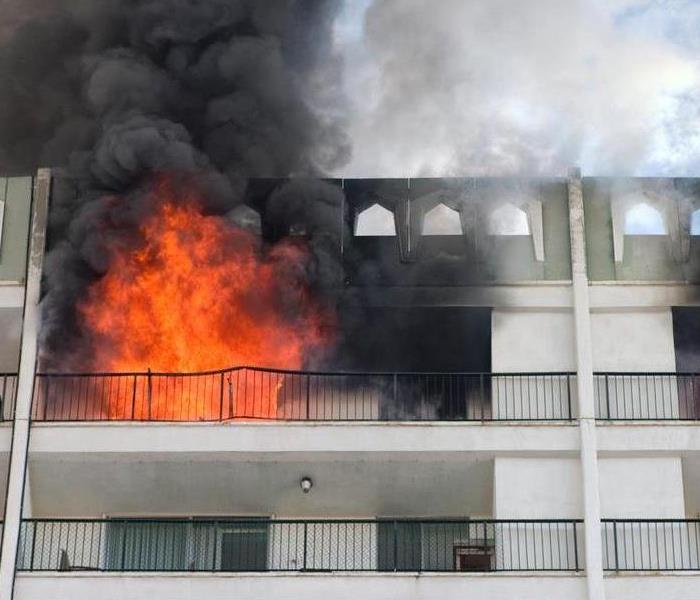 Secure a building after a fire to help prevent secondary damages.
Secure a building after a fire to help prevent secondary damages.
A fire can be a devastating event for any building, and its aftermath can be just as challenging. If your building has suffered from a fire, you'll need to take steps to keep it secure and safe, both for yourself and for any visitors or tenants. Here are some tips on how to keep your building secure after a fire.
Inspect the Building
After a fire, it's important to inspect the building for damage. If you're not sure how to do this, consider hiring a professional inspector to assess the damage. Look for any structural damage, such as cracks or bulges in the walls, floors, or ceilings, and make sure all doors and windows are secure. Don't forget to check the roof, as it can be a common place for damage to occur.
Secure the Building
If there are any holes or openings in the building's exterior, such as broken windows or doors, you'll need to secure them. This can be done by covering the openings with plywood or boarding them up. Make sure that all entrances and exits are secure, and consider installing security cameras to monitor the building.
Check the Utilities
Before anyone can enter the building, it's essential to ensure that all utilities, such as gas, water, and electricity, are turned off. If any of these utilities were damaged in the fire, don't attempt to turn them back on yourself. Instead, contact a licensed professional to inspect and repair them.
Remove Debris
The aftermath of a fire can leave a lot of debris, such as burnt furniture, building materials, and personal belongings. Not only is this debris unsightly, but it can also be a safety hazard. Hire a professional cleaning company to remove any debris and thoroughly clean the building.
Keep the Building Safe
Even after the building has been secured, it's important to keep it safe. If the building is unoccupied, consider installing an alarm system that can alert you if someone tries to enter. If there are any hazards, such as loose wiring or damaged gas lines, have them repaired immediately.
Be Prepared for Future Emergencies
Finally, it's essential to be prepared for future emergencies. Make sure that you have an emergency plan in place and that all tenants or visitors are aware of it. Consider installing smoke detectors, fire extinguishers, and other safety equipment throughout the building.
In conclusion, keeping your building secure after a fire requires a combination of diligence and preparation. By taking the necessary steps to inspect, secure, and clean the building, as well as being prepared for future emergencies, you can help to ensure the safety and security of your building and its occupants.
Preparing for a Fire with Pets and Kids
12/1/2022 (Permalink)
 If you do experience a fire in your Auburn home, give SERVPRO of Auburn/Enumclaw a call.
If you do experience a fire in your Auburn home, give SERVPRO of Auburn/Enumclaw a call.
Preparing for a Fire with Pets and Kids
When you've got children and pets, fire safety can be especially challenging. Fortunately, there are steps that you can take to help keep your family safe. We'll explore how to prepare for a fire when you have kids and pets, including how to create a plan for everyone in your family -- especially small children and pets -- as well as how to make sure everyone knows how to use emergency equipment like fire extinguishers and fire ladders. Once we're done here, we'll dive into some specific tips on making sure your pet is safe in case of an emergency as well!
Create a Fire Safety Plan
As a parent, you want to keep your kids safe from all the things that can hurt them. But when a fire breaks out and you have to get out quickly, it can be hard to think rationally about what to do next. A fire plan will help everyone in your family understand how to react if there's ever an emergency so that if something does happen, everyone knows what their role is in getting out safely. When it comes to pets, it's also important for everyone in the family -- including children -- to know which doors or windows are accessible for animals as well as people, and where they can go once outside.
Know How To Use Emergency Equipment
Fire extinguishers are a great way to get the flames out quickly. But if you’re not sure how to use one, you may need some training.
Here’s how to do it:
- Read the instructions that come with your fire extinguisher before you use it for the first time and make sure you understand them completely
- Keep your eyes on what you're doing at all times
- Have someone else nearby who knows what they're doing when using an extinguisher as well
Know Two Ways Out of Each Room
If you are unable to exit your home, do not go back in. Smoke and heat can kill within minutes. This is why it is important that everyone in the house knows at least two ways out of each room and where they go when they leave the house (e.g., a neighbor’s or friend’s house). If you have pets, make sure they know how to get out too!
You can also use an escape ladder as a last resort if all other options are unavailable.
Make a Plan for Pets
If you have pets, make a plan for them as well. Locate all their favorite hiding spots and make sure that those are the places where you can reach them in an emergency. Make sure you have a way to get them out if they get stuck. Pets can be extremely resourceful when it comes to escaping from danger, but they might need your help getting over a fence or finding an alternate escape route if their usual one is blocked by debris.
Prepare an Emergency Kit
Whether it's a fire in your home or elsewhere, you need to be prepared before you leave. Pack a bag with the following items:
- Flashlights
- First aid kit
- Important documents (like birth certificates and insurance policies) that can be grabbed on the way out of your home.
If you have pets or kids, include an extra set of keys for them as well so they don't get locked inside. You'll also want to include a whistle so that everyone can find each other easily once outside
Use an Escape Ladder
A fire escape ladder is a tool to help people escape a burning building. It is not a substitute for having an escape plan in place, which should include knowing two ways out of every room and being able to identify the closest exit in any emergency situation. The ladder should be placed in the bedroom window closest to the ground, securely fastened to the wall, and easily accessible from inside without obstructing access by other occupants who might need it as well.
Teach Kids Fire Safety
As you're teaching your kids about fire safety, it's important to explain that smoke rises. This means that if there's a fire in the kitchen, they should not go through a door or window to escape. Instead, they should position themselves as low to the ground as possible and crawl under the smoke until they find an exit or get help from an adult.
You can also teach them that smoke is often trapped around vents, windows and doors—because it gets sucked into these areas by air currents—so keeping low is even more important when escaping from these areas of your home.
We know that preparing for a fire can be overwhelming, but it's important to remember that you are not alone. You have your friends and family who can help you prepare for the worst and make sure everyone is safe in case of an emergency. If you do experience a fire in your Auburn home, give SERVPRO of Auburn/Enumclaw a call to restore it back to its preloss condition!
3 Dryer Cleaning Tips To Prevent Lint Fire
6/23/2022 (Permalink)
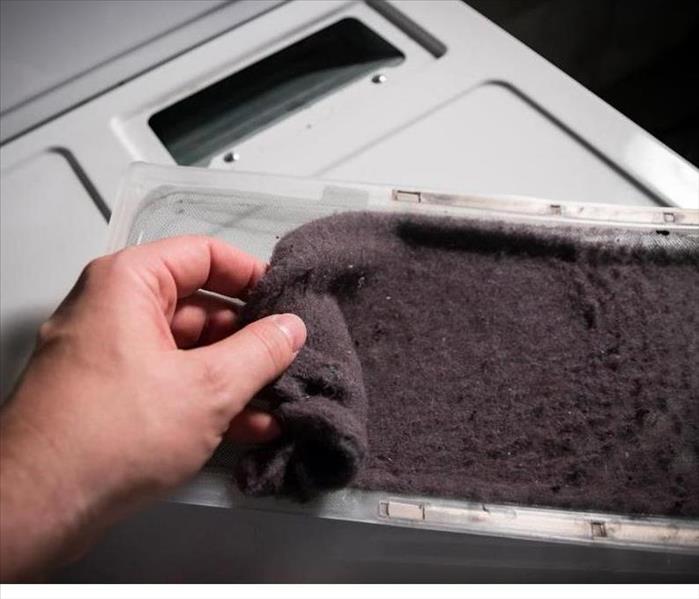 Dryer fires in homes are more prevalent than you would believe. If a house fire occurs, a fire damage restoration company can help.
Dryer fires in homes are more prevalent than you would believe. If a house fire occurs, a fire damage restoration company can help.
3 Dryer Cleaning Tricks to Avoid Lint Fires
In many households, a clothes dryer is considered a necessity to efficiently accomplish the daily laundry task. While the convenience is desirable, most people do not realize that without proper cleaning and maintenance, it could spark a lint fire, which is one of the leading causes of home fires in the United States. Here are three dryer cleaning protocols that will help keep your home safe in Auburn, WA.
1. Reduce Dryer Fire Hazards With Daily Filter Cleaning
The lint filter is the first line of defense to prevent flammable lint from getting into your dryer's ventilation system. You need to clean out lint often because a clogged filter is dangerous and causes your dryer to function poorly. Remove lint from the filter before and after each load of laundry and check for lint behind the dryer regularly to reduce the chance of having a lint fire.
2. Hire a Professional To Conduct Ductwork Maintenance
Even if a clogged vent doesn't lead to a potential fire right away, your dryer will no longer dry your clothes, which is a sign that your vent ductwork needs a thorough cleaning. You should consider hiring a professional service to clean the exhaust system yearly to decrease fire hazards and keep your dryer working optimally. Professionals have the special equipment that may be required to snake out the dryer exhaust.
3. Check the Outside Vent Opening for Blockages
Hot air, lint, and dirt travel from the dryer through the dedicated ductwork to the outside wall of your house. If the outside opening is blocked, a lint fire can easily be initiated. Make sure the outdoor vent covering stays open and that nothing is blocking it, such as an animal's nest.
Residential dryer fires are more common than you might think. If a home fire does happen, a fire damage restoration company can help restore your home to pre-fire condition.
How Commercial Insurance Protects Your Business
5/6/2022 (Permalink)
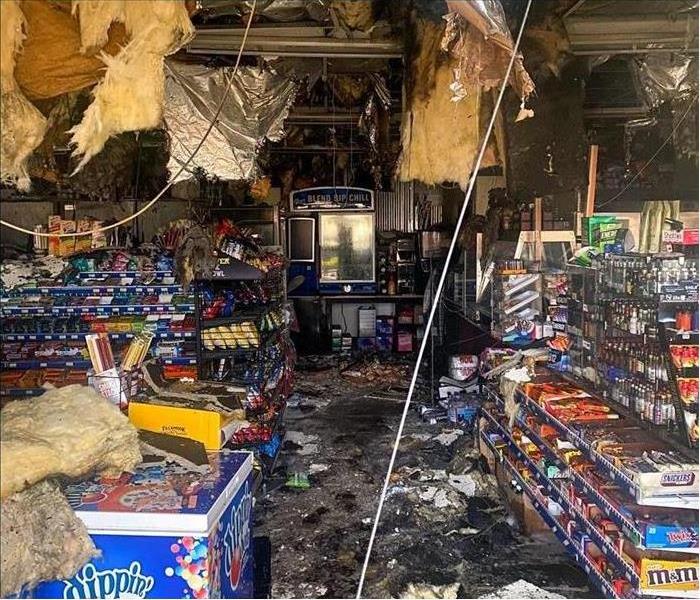 If a fire destroys your property, you could find yourself out of business unless you have commercial insurance.
If a fire destroys your property, you could find yourself out of business unless you have commercial insurance.
How Commercial Insurance Can Help Your Company
As a business owner in Oceola, WA, your physical assets are critical for maintaining a positive revenue stream. If a fire destroys your property, you could find yourself out of business unless you have commercial insurance.
How Much Will I Pay for Insurance?
The specific cost to insure your property depends on your type of policy. However, every policy includes:
- A premium or annual fee you must pay to maintain insurance
- A deductible you must pay for a claim before your insurance starts paying
- A policy limit or the maximum amount your policy will cover per claim
- Exclusions or specific losses your policy does not cover
What Can Your Policy Cover?
An insurance policy can protect your business and employees by helping to pay for fire cleanup and restoration services after a fire in your physical space. For example, you and your team may need to temporarily or permanently relocate when a fire damages and destroys the building where your business functions. In addition, commercial property insurance can help pay to repair or replace various physical assets to ensure your company's long-term operation.
If your business is inventory dependent, commercial insurance can replace stock destroyed by a fire and avoid service interruptions that could damage client relationships.
Also, your team relies upon equipment such as computers, phones and other electronics that a fire can damage and destroy. An insurance policy covering the repair and replacement of vital equipment and workstations for your team will ensure you can continue at least some of your business's daily operations.
Finally, a fire can also destroy paper contracts, receipts, leases, deeds, corporate charters, stock certificates and medical records. Your commercial policy may cover the costs to restore or replace valuable paper documents that sustain damage despite their safe storage.
A commercial insurance policy covering physical property after fire damage is essential for preserving your business's reputation and ensuring its long-term growth in Oceola, WA.
5 Reminders for Fire Safety When Grilling
4/9/2022 (Permalink)
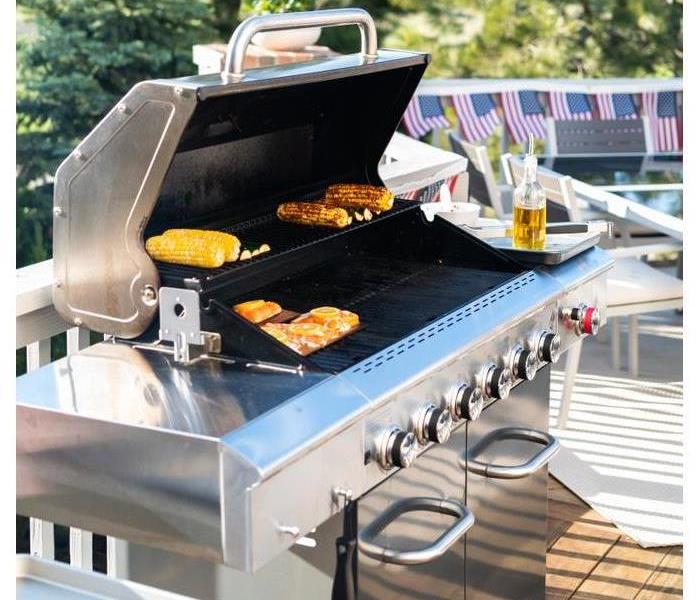 If you do experience a house fire, make sure to call in an emergency fire restoration team to help reduce damages.
If you do experience a house fire, make sure to call in an emergency fire restoration team to help reduce damages.
5 Fire Safety Reminders When Grilling
With upwards of 350,000 home fires in the U.S. each year, it is important to note that cooking-related incidents are the number one source of residential fires. While the majority of these occur indoors in kitchens, a significant number are caused by a grill fire. These blazes can spread quickly as they jump from the grill to wooden structures, grass and other combustible items. By keeping a few safety tips in mind, you can nearly eliminate the possibility of a barbeque fire.
1. Never Leave the Grill Unattended.
his is probably the greatest cause of outdoor fires from a grill. You might think this is a remote possibility, but sudden winds and the accumulation of grease make an out-of-control fire a real possibility.
2. Do Not Cook Near the Home.
Your grill should be a minimum of six feet away from any walls or vehicles. This gives you some room to spare in case the flames suddenly flare up due to grease or a sudden wind. If you are not careful, a grill fire could put your home in Enumclaw, WA, at risk.
3. Pay Attention to Your Surroundings.
You might have grilled a thousand times, but no two situations are exactly alike. Perhaps it has been an especially dry season and your lawn is bone dry. A single spark could ignite your lawn in a matter of seconds.
4. Always Maintain and Clean Your Grill.
Over time, your grill will accumulate a coating of grease and oil. Under the right conditions, this could burst into flames and quickly develop into a full-blown fire.
5. Always Keep a Fire Extinguisher Nearby.
If things go bad, make sure the handy fire extinguisher is within reach. This could save you from having to deal with major soot and smoke damage.
If you do experience a house fire, make sure to call in an emergency fire restoration team to help reduce damages. Trained technicians can help you recover from a grill fire.
3 Steps to Take After a Fire on Commercial Property
3/16/2022 (Permalink)
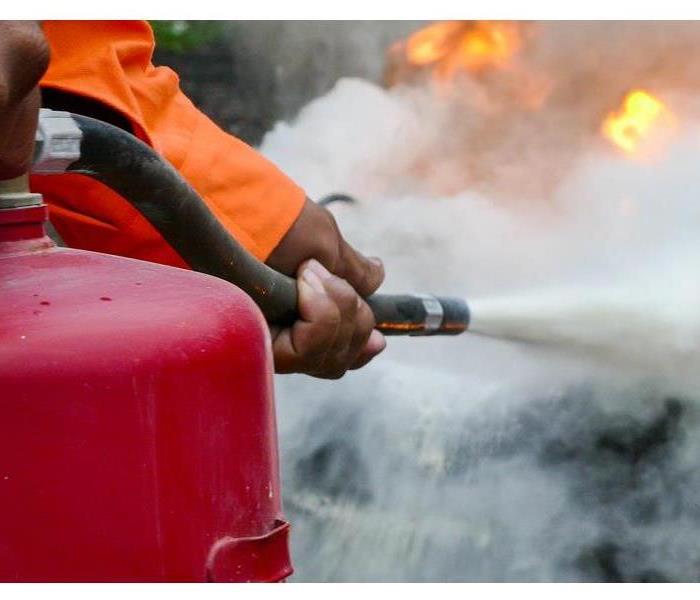 After fire damage hits your business, you probably be afraid, but you can count on SERVPRO for help, call us.
After fire damage hits your business, you probably be afraid, but you can count on SERVPRO for help, call us.
After A Commercial Property Fire, Follow These 3 Steps
If your business in Auburn, WA, has suffered from fire damage you may be wondering what to do next. There are a few recommended actions that may help get the restoration process started. Here are some steps to consider when beginning your fire cleanup.
1. Board Up the Property
One of the first steps many experts recommend is to board up the damaged property. This usually entails putting ply-board or tarps over the exterior of the damaged area in order to protect it from external forces. Not only can this help prevent further damage from wind and rain, but it may keep critters out of your property. It may also help discourage looting. Many insurance companies also require boarding up the area as part of your policy when filing a claim.
2. Get a Damage Assessment
Before repairs can begin, the fire damage on the property will need to be assessed. A team of fire restoration professionals can look over the damages and inform you what repairs will be necessary. These professionals can also formulate a plan for the best order of repair, and provide you or your insurance company with a repair cost estimate.
3. Begin Repairs
Once your property is protected against further damage, and you have an estimate of the repair needs, then you can begin the fire cleanup process. Repairs usually include debris removal, smoke odor remediation, and the cleaning of damaged items and equipment. Some companies may also offer electronics cleaning, document restoration and upholstery cleaning.
After fire damage hits your business these steps may help you get on track with your restoration. Boarding over the damaged area can help prevent the need for additional repairs. A damage assessment can help you understand what needs to be done and the best order. After your assessment you can begin the process of restoring your commercial property.
How Long Do Smoke Alarm Batteries Last?
2/3/2022 (Permalink)
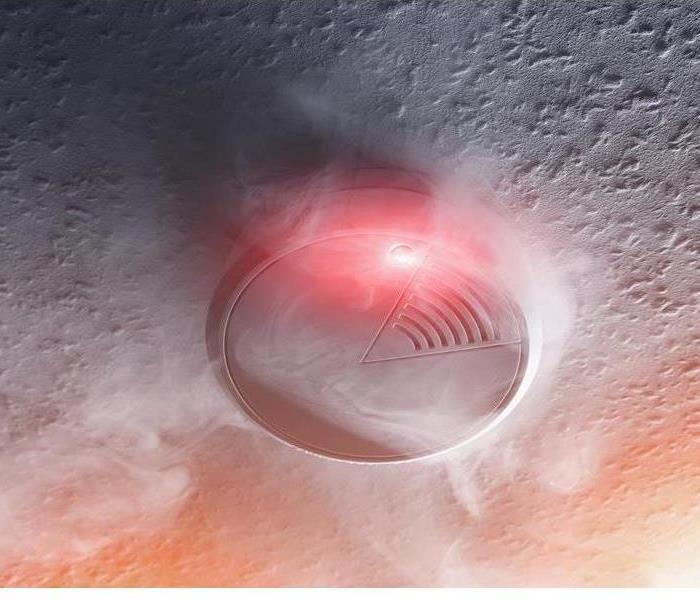 The aftermath of a fire in your Auburn home or business can be devastating. We specialize in fire damage restoration, call us!
The aftermath of a fire in your Auburn home or business can be devastating. We specialize in fire damage restoration, call us!
When It Comes To Smoke Alarm Batteries, How Long Do They Last?
A smoke alarm will only function if a power source is available. The batteries in alarms that are not hardwired, and the backup battery power in systems that are, should be switched out on a regular basis. It is advisable to be proactive and not to wait for a smoke detector to start beeping before changing the batteries. Find out more about the average operating life of different types of alarm batteries.
Alarms With Replaceable Batteries
Smoke alarms that rely on replaceable batteries may require various types. There are five common types of alkaline batteries:
Most smoke detectors with replaceable batteries use nine-volt or PP3 batteries. Make sure that you have spare batteries for any detector. Homeowners should replace the detector unit every 10 years.
Alarms With Non-Replaceable Batteries
Some newer smoke alarm models run on a lithium battery that has a 10-year operating life. Batteries in these detectors cannot be replaced. It will be necessary to purchase and install a new detector at the end of this period. Old detectors should be deactivated according to the instructions for each model prior to proper disposal.
Backup Batteries
Some building codes require homeowners to have hardwired smoke detection systems. A battery backup can ensure that these smoke alarms will continue to function even if the power goes out. These batteries should be replaced at least once a year.
Whether an alarm relies on replaceable alkaline batteries, a non-replaceable lithium battery, or is hardwired with a backup battery pack, it is important to replace batteries at least once a year. If a smoke alarm starts beeping before this time, go ahead and replace the battery. If a fire breaks out and damages or destroys building materials and contents at a residence in Bayne Junction, WA, homeowners should schedule a consultation with a fire damage restoration company.
4 Steps for Working with Fire Restoration Professionals
1/12/2022 (Permalink)
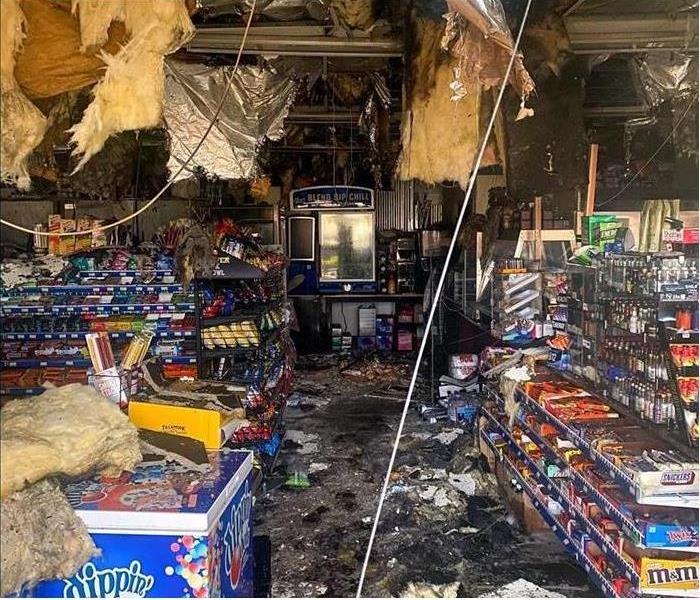 SERVPRO specialize in fire damage restoration, and we're dedicated to responding immediately when you need help.
SERVPRO specialize in fire damage restoration, and we're dedicated to responding immediately when you need help.
4 Steps To Collaborating With Fire Restoration Experts
After the first intense period of fighting workplace fires is over, an overwhelming sense of damage and restoration work may settle in. Signs of smoke damage, debris from the fire, and pools of water and chemicals could be everywhere you look. Fortunately, you don't have to tackle this problem on your own. What do you need to do?
1. Contact Professionals Right Away
In many cases, fire restoration and cleanup professionals in Auburn, WA, have an emergency response technician who will assess the fire damage and existing risks. This professional, or team of professionals, will probably patch up any holes in the roof, missing windows, and other points of exposure. This board-up and tarp service is key to keeping out inclement weather and potential looters.
2. Arrange to Meet Specialists
The second step in working with the cleanup team is to arrange a time for an assessment technician to visit your Auburn, WA, property. At this point, professionals take note of the extent of the fire and smoke damage. This step is crucial for planning the rest of the work and is often required by insurance companies. Without adequate communication, you may not get the coverage you want.
3. Cooperate With Cleanup Crews
As soon as possible, the technicians will begin removing water. They may haul in heavy equipment, such as dehumidifiers and fans, and may ask you for permission to move existing furnishings. To complete the drying process, doors and windows may be propped open. The technicians can get their work done more efficiently in a cooperative environment.
4. Keep Communication Lines Open
A lot of cleanup may take place when you aren't on location. Provide the cleanup team with your phone number, so they can get permission before discarding items with heavy soot damage or using specific chemical cleaners.
Smoke damage restoration is a task that these professionals are prepared to complete to your satisfaction. The experts who handle fire, water, and smoke cleaning can often provide all the work necessary to get your work space looking as good as new, especially when you work together.

 24/7 Emergency Service
24/7 Emergency Service









